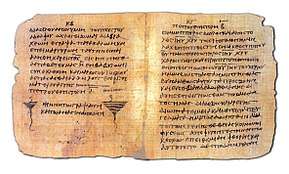2 Peter 1
2 Peter 1 is the first chapter of the Second Epistle of Peter in the New Testament of the Christian Bible. The author identifies himself as "Simon Peter, a bondservant and apostle of Jesus Christ" and the epistle is traditionally attributed to Peter the Apostle, but there are charges that it is a work of Peter's followers between 60-90 CE.[1][2][3]
| 2 Peter 1 | |
|---|---|
 1 Peter 5:12–end and 2 Peter 1:1–5 on facing pages of Papyrus 72 (3rd/4th century) | |
| Book | Second Epistle of Peter |
| Category | General epistles |
| Christian Bible part | New Testament |
| Order in the Christian part | 22 |
Text
The original text was written in Koine Greek. This chapter is divided into 21 verses.
Textual witnesses
Some early manuscripts containing the text of this chapter are:
- Papyrus 72 (3rd/4th century)
- Codex Vaticanus (B or 03; 325-350)
- Codex Sinaiticus (א or 01; 330–360)
- Codex Alexandrinus (A or 02; 400–440)
- Codex Ephraemi Rescriptus (C or 04; c. 450; extant verses 2–21)[4]
Relationship with the Epistle of Jude
There is an obvious relationship between the texts of 2 Peter and the Epistle of Jude.[5] The shared passages are:[6]
| 2 Peter | Jude |
|---|---|
| 1:5 | 3 |
| 1:12 | 5 |
| 2:1 | 4 |
| 2:4 | 6 |
| 2:6 | 7 |
| 2:10–11 | 8–9 |
| 2:12 | 10 |
| 2:13–17 | 11–13 |
| 3:2-3 | 17-18 |
| 3:14 | 24 |
| 3:18 | 25 |
Salutation (1:1–2)
Verse 1
- Simon Peter, a servant and an apostle of Jesus Christ,
- to them that have obtained like precious faith with us through the righteousness of God and our Saviour Jesus Christ:[7]
- "Simon" (Ancient Greek: Συμεὼν, Symeōn[8]): a transliteration of the Hebrew name (cf. Acts 15:14), used together with "Peter" (as in Matthew 16:16) as a reminder of 'the change grace had brought about in the apostle's life'.[9]
- "A servant and an apostle": 1 Peter 1 uses only the second title, whereas Jude uses the first.[9] The apostle calls himself with these titles to emphasize his authority as someone who is merely a slave but fully commissioned by his Master for his work.[9]
- "Obtained" (Greek: λαχοῦσιν, lachousin[8]) or "received",[10] with a meaning of "obtained by lot", implying "grace", not "merit", as the source of this gift.[9]
A call to spiritual growth (1:3–11)
As Christians have obtained the "power" and "promise" for their resources, Peter urges that they "make every effort" (verse 5) to achieve the goal, that is "to grow to be like Jesus", following the steps towards it (verses 5–7):[11]
- love
- brotherly kindness
- godliness
- perseverance
- self-control
- knowledge
- goodness
- faith[11]
Reasons for the emphasis (1:12–21)
Verse 18
- And we heard this voice which came from heaven when we were with Him on the holy mountain.[12]
Reference to Transfiguration of Jesus (Matthew 17:1–12; Mark 9:2–13; Luke 9:28–36)
- "The holy mountain": the mountain was sacred because it became 'the scene of a divine revelation' (cf. Exodus 3:5; 19:23).[13]
See also
- Transfiguration of Jesus
- Saint Peter
- Jesus Christ
- Related Bible parts: Matthew 17, Mark 7, Luke 9, Hebrews 11
References
- Duff 2007, p. 1271.
- Davids, Peter H. (1982). I Howard Marshall and W Ward Gasque (ed.). New International Greek Testament Commentary: The Epistle of James (Repr. ed.). Grand Rapids, Mich.: Eerdmans. ISBN 0802823882.
- Evans, Craig A (2005). Craig A Evans (ed.). Bible Knowledge Background Commentary: John, Hebrews-Revelation. Colorado Springs, Colo.: Victor. ISBN 0781442281.
- Eberhard Nestle, Erwin Nestle, Barbara Aland and Kurt Aland (eds), Novum Testamentum Graece, 26th edition, (Stuttgart: Deutsche Bibelgesellschaft, 1991), p. 689.
- Callan 2004, p. 42.
- Robinson 2017, p. 10.
- 2 Peter 1:1 KJV
- Greek Text Analysis: 2 Peter 1:1. Biblehub.com
- Wheaton 1994, p. 1389.
- Note [a] on 2 Peter 1:1 in NKJV
- Wheaton 1994, p. 1390.
- 2 Peter 1:18 NKJV
- Wheaton 1994, p. 1391.
Sources
- Callan, Terrance (2004). "Use of the Letter of Jude by the Second Letter of Peter". Biblica. 85: 42–64.
- Duff, Jeremy (2007). "78. 2 Peter". In Barton, John; Muddiman, John (eds.). The Oxford Bible Commentary (first (paperback) ed.). Oxford University Press. pp. 1270–1274. ISBN 978-0199277186. Retrieved February 6, 2019.
- Robinson, Alexandra (2017). Jude on the Attack: A Comparative Analysis of the Epistle of Jude, Jewish Judgement Oracles, and Greco-Roman Invective. The Library of New Testament Studies. Bloomsbury Publishing. ISBN 978-0567678799.
- Wheaton, David H. (1994). "2 Peter". In Carson, D. A.; France, R. T.; Motyer, J. A.; Wenham, G. J. (eds.). New Bible Commentary: 21st Century Edition (4, illustrated, reprint, revised ed.). Inter-Varsity Press. pp. 1386–1396. ISBN 9780851106489.
External links
- 2 Peter 1 King James Bible - Wikisource
- English Translation with Parallel Latin Vulgate
- Online Bible at GospelHall.org (ESV, KJV, Darby, American Standard Version, Bible in Basic English)
- Multiple bible versions at Bible Gateway (NKJV, NIV, NRSV etc.)